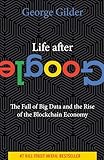Life after Google : the fall of big data and the rise of the blockchain economy / George Gilder.
By: Gilder, George F [author.].
Material type: BookPublisher: Washington, District of Columbia : Regnery Gateway, [2018]Copyright date: ©2018Description: 1 online resource (xv, 320 pages) ; 22 cm.Content type: text Media type: unmediated Carrier type: volumeISBN: 9781684512935.Other title: Fall of big data and the rise of the blockchain economy.Subject(s): Internet -- Forecasting | Internet -- Security measures | High technology industries -- California -- Santa Clara Valley (Santa Clara County) -- Forecasting | Blockchains (Databases) | Electronic commerceDDC classification: 338.4760979473
BookPublisher: Washington, District of Columbia : Regnery Gateway, [2018]Copyright date: ©2018Description: 1 online resource (xv, 320 pages) ; 22 cm.Content type: text Media type: unmediated Carrier type: volumeISBN: 9781684512935.Other title: Fall of big data and the rise of the blockchain economy.Subject(s): Internet -- Forecasting | Internet -- Security measures | High technology industries -- California -- Santa Clara Valley (Santa Clara County) -- Forecasting | Blockchains (Databases) | Electronic commerceDDC classification: 338.4760979473 | Current location | Call number | Status | Notes | Date due | Item holds |
|---|---|---|---|---|---|
| University of Santo Tomas-Legazpi Main Library Circulation | Circ. HC 107.C23 .G55 2018 (Browse shelf) | Available | JB |
Browsing University of Santo Tomas-Legazpi Main Library Shelves , Shelving location: Circulation Close shelf browser

|

|

|

|

|

|

|
||
| Circ. HA 32 .A33 2023 Student study guide with IBM® SPSS® workbook for research methods, statistics, and applications / | Circ. HA 32 .S39 2019 An easyguide to research design and SPSS / | Circ. HC 79.E5 .F85 2022 Fulfilling the sustainable development goals / | Circ. HC 107.C23 .G55 2018 Life after Google : | Circ. HD 30.215 .B54 2022 Big data analytics / | Circ. HD 38.5 .H53 2023 Supply chain management / | Circ. HD 57.7 .B76 2018 Work that works : |
Word "Google" on title page and spine printed upside down and backwards.
Includes bibliographical references (pages 285-312) and index.
Prologue: Back to the future-- the ride -- Don't steal this book -- Google's system of the world -- Google's roots and religions -- End of the free world -- Ten laws of the cryptocosm -- Google's datacenter coup -- Dally's parallel paradigm -- Markov and Midas -- Life 3.0 -- 1517 -- The heist -- Finding Satoshi -- Battle of the blockchains -- Blockstack -- Taking back the net -- Brave return of Brendan Eich -- Yuanfen -- The rise of sky computing -- A global insurrection -- Neutering the network -- The empire strikes back -- The Bitcoin flaw -- The great unbundling -- Epilogue: The new system of the world.
"The Age of Google, built on big data and machine intelligence, has been an awesome era. But it's coming to an end. In Life after Google, George Gilder--the peerless visionary of technology and culture--explains why Silicon Valley is suffering a nervous breakdown and what to expect as the post-Google age dawns. Google's astonishing ability to 'search and sort' attracts the entire world to its search engine and countless other goodies--videos, maps, email, calendars ... And everything it offers is free, or so it seems. Instead of paying directly, users submit to advertising. The system of 'aggregate and advertise' works--for a while--if you control an empire of data centers, but a market without prices strangles entrepreneurship and turns the Internet into a wasteland of ads. The crisis is not just economic. Even as advances in artificial intelligence induce delusions of omnipotence and transcendence, Silicon Valley has pretty much given up on security. The Internet firewalls supposedly protecting all those passwords and personal information have proved hopelessly permeable. The crisis cannot be solved within the current computer and network architecture. The future lies with the 'cryptocosm'--The new architecture of the blockchain and its derivatives. Enabling cryptocurrencies such as bitcoin and ether, NEO and Hashgraph, it will provide the Internet a secure global payments system, ending the aggregate-and-advertise Age of Google. Silicon Valley, long dominated by a few giants, faces a 'great unbundling, ' which will disperse computer power and commerce and transform the economy and the Internet."--Jacket.
Google's ability to "search and sort" attracts the entire world to its search engine and countless other goodies-- videos, maps, email, calendars. Everything it offers is free ... or so it seems. Instead of paying directly, users submit to advertising. The Internet firewalls supposedly protecting all our passwords and personal information have proved hopelessly permeable. The future lies with the "cryptocosm": the new architecture of the blockchain and its derivatives. Gilder explains why Silicon Valley is suffering a nervous breakdown and what to expect as the post-Google age dawns. -- adapted from jacket.


There are no comments for this item.